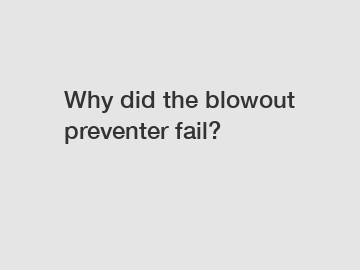Why did the blowout preventer fail?
Why Did the Blowout Preventer Fail?
The Deepwater Horizon disaster that occurred in 2010 was one of the worst oil spills in history, causing significant environmental and economic damage. One of the main contributing factors to the severity of the disaster was the failure of the blowout preventer (BOP). The BOP, which is supposed to be the last line of defense against a blowout, failed to contain the flow of oil, resulting in the uncontrolled release of millions of barrels into the Gulf of Mexico. This article will explore the reasons behind the failure of the blowout preventer.
Insufficient Maintenance and Testing.

One of the primary causes of the blowout preventer's failure was the lack of routine maintenance and testing. The BOP had not been properly inspected or tested for several years leading up to the disaster. As a result, critical components, such as the shear rams and hydraulic systems, were not in optimal condition to handle the high-pressure situation during the blowout. Regular maintenance and thorough testing are essential to ensure the functionality of the blowout preventer during emergencies.
Design Flaws and Insufficient Redundancy.
Another significant factor contributing to the failure of the blowout preventer was its design flaws and lack of redundancy. The blowout preventer installed on the Deepwater Horizon rig was a single-shear ram design, which meant that it had only one set of shear rams to cut and seal the pipe in an emergency. This design lacked the necessary redundancy to handle complex situations and multiple pipe sizes, making it vulnerable to failure in case one set of shear rams malfunctioned or was not suited to the specific conditions.
Inadequate Training and Human Error.
Human error and inadequate training also played a substantial role in the failure of the blowout preventer. The personnel responsible for operating and maintaining the BOP were not adequately trained to handle the equipment effectively. Furthermore, during the critical moments leading up to the blowout, there were significant miscommunications and misunderstandings among the crew, which prevented prompt actions from being taken. This lack of coordination and proper training contributed to the failure of the blowout preventer.
Regulatory Oversight and Enforcement.
The failure of the blowout preventer also highlighted issues with regulatory oversight and enforcement within the oil industry. The blowout preventer was subject to inspection and regulation by various organizations, including the American Petroleum Institute (API) and the Minerals Management Service (MMS). However, there were instances of inadequate inspections and lax enforcement of maintenance and testing requirements on offshore rigs. This lack of stringent oversight allowed for possible equipment failures, such as the blowout preventer, to go unnoticed or uncorrected.
Conclusion.
In conclusion, the failure of the blowout preventer on the Deepwater Horizon rig was a catastrophic event with far-reaching consequences. The inadequate maintenance and testing, design flaws, insufficient redundancy, human error, and regulatory oversight all contributed to the failure of this critical safety component. To prevent such disasters in the future, it is crucial to prioritize routine maintenance, conduct thorough testing, improve design standards, enhance training programs, and enforce strict regulatory oversight. By learning from the mistakes of the past, we can strive for a safer and more reliable offshore drilling industry.
If you have any further questions or concerns regarding blowout preventers or offshore drilling safety, please do not hesitate to contact us.
If you want to learn more, please visit our website 2000psi Annular BOP, types of blowout preventer, bop equipment.
169
0
0

Comments
All Comments (0)